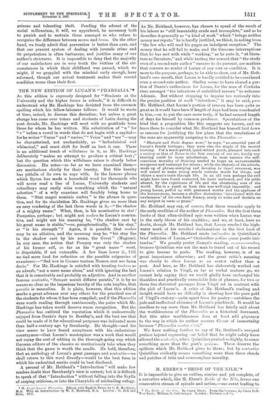RUSSIAN AND FRENCH PRISONS.*
ON all matters appertaining to the prisons of Russia and France, Prince Kropotkin is able to speak with authority. He has spent in them several years of his life, and his first acquaint- ance with the gaol system of his native country was made so long ago as 1862, when, as aide-de-camp to General Kukel, Governor of Trausbaikalia, he was appointed secretary to a Commission for the reform of Siberian prisons. It was the age of illusion and hope, the emancipation of the serfs had filled the hearts of reformers with joy, and the young officer took up the work with characteristic ardour and energy. At that time, the arbitrary despotism of prison directors had no limits, and the "dreadful tales" which circulated about one of the gaols, that of Ruzghildeef, were fully confirmed by the inquiries of the Commission. "Terrible epidemics of scurvy swept away the prisoners by hundreds each year that a more active extraction of gold was ordered from St. Petersburg, and the underfed convicts were compelled to overwork." The effects of overcrowding were horrible and heartrending. The local lock-ups, for the reception of convicts en route for the mines, were quite as bad, answering literally to the well-known description of Dostoieveky, in his Buried Alive. The Committee would fain have extirpated these evils, and introduced a new and better system, but by the time their investigation was finished and their report prepared, the advocates of reaction had gained the upper hand in the councils of the Czar. The good intentions of 1859-62 were forgotten, the idea of reform was dropped, and Ministerial circulars insisted once more on the necessity of strong rule and a stern discipline. General Kukel was replaced by a Governor of less liberal views, who with great difficulty was persuaded to sign the report and send it to St. Petersburg, where it may still be found, thinks its author, in the portfolio of some Minister. For ten years thereafter, the question of prison reform remained in abeyance, and though in 1872, and again in 1877, fresh reports were prepared and new schemes elaborated, naught has come of them ; the old system is maintained practically intact, and its worst features are still tolerated by the State. True, the twenty thousand people exiled yearly to Siberia (two-thirds of them without trial) are no longer compelled to do the entire journey on foot; it is found cheaper to let them travel a part of the way by river and rail ; yet they have still to tramp two thousand miles, in some instances double that distance ; and though hard. labour convicts are not now doomed to waste their lives in the silver-mines of Nertchinsk, they are sent to almost certain death in the hyperborean climate of Sakhalin. All so-called Russian reforms seem to be attended with the same fatality. Announced with a great flourish of trumpets, as if to call the world's atten- tion to the fact that Russia, though a despotism, ie progressive, they are either made under conditions that render them nugatory, or the authorities, alarmed by their own temerity, take back with one hand all they have given with the other,— often more.
The first part of Prince Kropotkin's book," Russian Prisons," so abounds with striking facts, suggestive observation, and vivid description, that there is hardly a page that does not contain passages which we are tempted to quote. Take the following on administrative exile:—
"A punishment as terrible as exile—it may be for life—within the Arctic Circle in Siberia is pronounced on mere reports of gendarmerie • In Russian and French Prisons. By P. Kropotkin. London: Ward and Downey. officers. In fact, Administrative Exile is resorted to in all cases where there is not the slightest indication which could lead to a con- demnation, even by a packed court. You are exiled to Siberia because it is impossible to commit you for trial, there being no proofs against yon,' is the cynical form in which the announcement is made to the prisoner. Be happy that you have escaped so cheaply, they add ; and people are sent for five, ten, fifteen years to some small borough of five hundred inhabitants within or in the vicinity of the Arctic Circle. In this category are included not only the cases of political offenders who are eupposed to belong to some secret society; bat also those of religions dissenters ; of people who frankly speak out their opinion on the Government ; writers whose romances are con- sidered ' dangerous; almost all persons accused of disobedience,' and being of 'turbulent character;' workmen who have been active in strikes ; those accused of verbal offences 'against the Sacred Person of his Majesty the Emperor,' under which head 2,500 persons were arrested in 1881, in the course of six months; in short, all those cases which might tend—to use the official language—' to the produc- tion of excitement in the public mind,' were they brought before a Court."
No wonder that Russia breeds Nihilists, and that, hopeless of redress for cruel wrong, they should be goaded to commit deeds which injure their cause and which humanity condemns. The statements of Prince Kropotkin, Stepniak, and others touching the horrors of Russian prisons, though often contradicted, have never been confuted. They rest on the testimony of a cloud of witnesses, beginning with Dostoievsky (who was in no sense a Nihilist), and are confirmed, both directly and indirectly, by the reports of various Commissions, and articles which the Govern- ment, in its occasional lucid intervals, has allowed to appear in reviews and other periodical publications. As, moreover, copies of these publications are to be found in the library of the British Museum, readers who understand Russian may easily verify most of the author's statements for themselves. He has eliminated from them, as he tells us in his preface, not only the "controversial element," but everything that cannot be sup- ported by documents which may be published without causing harm to " our friends in Russia ;" and the book throughout is characterised by a calmness of spirit and a sobriety of tone which are alike incompatible with random assertions and ground- less charges.
The part of the book which will prove most attractive to many readers is that which concerns the prisons of France. The majority of Englishmen take more interest in things French than in things Russian, and the author's account of his three years' incarceration in the prison of St. Paul at Lyons, and the central gaol of Clairvaux, will be found both enter- taining and instructive. As " politicals," Prince Kropotkin and his companions received at Clairvaux exceptional, and, on the whole, indulgent treatment. They were treated pretty much as "first-class misdemeanants" are treated in this country. They kept their own clothes, they were not compelled to shave, they might smoke, they were allowed to cultivate a little garden, "fifty yards long and ten yards wide," and could dispose of their time as they thought fit. Reading and the study of languages were their principal occupations. The study of languages was very successful. The Prince's French comrades learnt with ease English, German, Italian, and Spanish ; during their two years' incarceration, some of them learnt two languages. Another occupation was bookbinding. They made their own tools "oat of pieces of iron and wood," utilised small carpenters' presses, and in the end "most of us reached perfection in the art." As for the French system in general, the facts adduced by Prince Kropotkin, though they hardly bear out his conclusion that it causes more crimes than it prevents, show that it is extremely defective :—
" In France, two-fifths to one-half of all brought before the assizes, and two-fifths of all brought before the Police Correotionnelle Courts, are released prisoners. No less than 72,000 recidivistes are arrested every year ; 42 to 45 per cent. of all assassins, 70 to 72 per cent. of all thieves, condemned every year are recidivistes. In great towns the proportion is still more dreadfnl. Of all arrested at Paris in 1880, more than one.fourth had been condemned more than four times during the last ten years. As to central prisons, 20 to 40 per cent. of all prisoners released from them are retaken during the first year after their release, chiefly daring the very first months which they spend at liberty ; and the number of recidivistes would be still larger if so many liberated prisoners did not disappear, change their names and profession, emigrate, or die shortly after their liberation."
One of the worst features of the French system is the treat- ment of children. The adult convict may be sent to prison for a few months; the boy for the same offence is invariably sent to a House of Correction, and kept there until hie eighteenth or twenty-first year. Among the anarchists prosecuted at Lyons was a boy of fifteen, called Crier, accused of abusing the police. He was ordered to be kept in prison until he should be
twenty-one, while a man found guilty of a similar offence got off with a year's imprisonment. Prince Kropotkin describes the penal colonies and reformatories to which these boys are generally consigned as hotbeds of shameful crimes. The boys with whom he came in contact at Lyons—mostly runaways and incorrigibles—were utterly brutalised. The warden; and the priest of the St. Paul prison were unanimous in declaring them
to be irreclaimable victims of the basest passions, foredoomed to pass the greater part of their lives in gaol, and die either in a central prison or New Caledonia.
As Prince Kropotkin rightly says, the treatment of law- breakers is one of the most important subjects that can engage the attention of social reformers. Every year one hundred thousand men, women, and children are imprisoned in England alone, in the whole of Europe nearly a million, at a cost of ten millions sterling, in addition to the value of their depredations, and ex- clusive of the expenses " involved in the maintenance of the huge machinery which supplies prisons with their inmates. Are our prisons worth the enormous outlay in human labour yearly devoted to them ? Do they guarantee society against the recurrence of the evils which they are supposed to combat ?" These questions Prince Kropotkin answers very emphatically in the negative, and though we utterly reject both his premisses and his conclusions, we cannot deny the talent which he brings to their discussion. He is apparently a fatalist who disbelieves in responsibility, and therefore in crime. In common with several recent writers in France, Italy, and Germany, he regards "the great social phenomenon which has been called crime," as social disease, and would have it treated as bodily disease is treated,—by preventative measures in the first instance ; by cura- tive measures in the second. Regarding criminals as the victims of circumstances, he holds that society has no right to punish people for misfortunes for which they are not responsible, and concludes that imprisonnient aggravates, instead of diminishing, the evils which it is supposed to check :— " Unhappily, hitherto our penal institutions have been nothing but a compromise between the old ideas of revenge, of punishment of the bad will,' and sin,' and the modern ideas of deterring from crime, both softened to a very slight extent by some notions of philanthropy. But the time, we hope, hal not far distant when the noble ideas which have inspired Grieeinger, Krafft-Ebbing, Despine, and some of the modern Italian criminaliste like Colajenni and Perri, will become the property of the general public, and make us ashained of having con- tinued so long to hand over those whom we call criminals to hangmen and jailers. If the conscientious and extensive labours of the writers just named were more wide!, known, we ehoiild all easily understand that most of those who are kept now in jails, or put to death, are merely people in need of the most careful fraternal treat-
ment What most of those who are now sent to jail are in need of is merely fraternal help from those who Surround them, to aid them in developing more and more the higher instincts of human nature which have been checked in their growth either by some bodily disease—anemia of the brain, disease of the liver or the stomach— or, still more, by the abominable conditions under which thousands and thousands of children grow up, and millions of adults are living, in what are called our centres of civilisation. Bat these higher faculties cannot be exercised when man is deprived of liberty, of the free guidance of his actions, of the multifarious Mt:bosoms of the human world. Let us carefully analyse each branch of the moral unwritten law, and we shall always find—as good old Grieeinger said—that it is not due to something which has suddenly sprang up in the man who accomplished it : it is the result of effect; which for years past have deeply stirred within him."
This is mere fatalism. The principles enunciated by Grieeinger, if pushed to their logical conclusion, would not only place well-doers and evil-doers on the same level, but render blame, for any act whatsoever, an injustice, and praise a work of supererogation. We are all in some measure the victims of circumstances, and none of us can do anything that is not more or less " the result of effects which for years past have deetily stirred within us." The social organisation to which our author so strongly objects is a case in point. It has been evolved, not self-created, and he ought to hold in equal respect those by whom it is upheld and those by whom it ie denounced, kings and capitalists being as much the "results of effects" as anarchists and philanthropists. We fear that Prince Kropotkin thinks a great deal better of human nature than it deserves, and take leave to donbt the possibility of reforming confirmed malefactots by "paternal" or any other treatment. We must, moreover, take things as they are ; and it is idle to discuss whether criminality lies in the nature of things, or is the outcome of a vicious social organisation. The criminals are with us, and have to be dealt with by the beet means at our command. If our ancestors had managed matters differently, we might have had no burglars ; bat this does not seem quite a sufficient reason for al”lishing prisons and tolerating theft. Pending the advent of the social millennium, it will, we apprehend, be necessary both to punish and to restrain those amongst us who refuse to recognise the difference between vneum and Etym. On the other band, we freely admit that prevention is better than cure, and that our present system of dealing with juvenile crime and its perpetrators is often barbarous, and justifies many of our author's strictures. It is impossible to deny that the majority of our malefactors are in very truth the victims of the cir- cumstances in which their childhood was passed, which we might, if we grappled with the mischief early enough, have reformed, though our actual treatment makes their second condition worse than their first.




















































 Previous page
Previous page